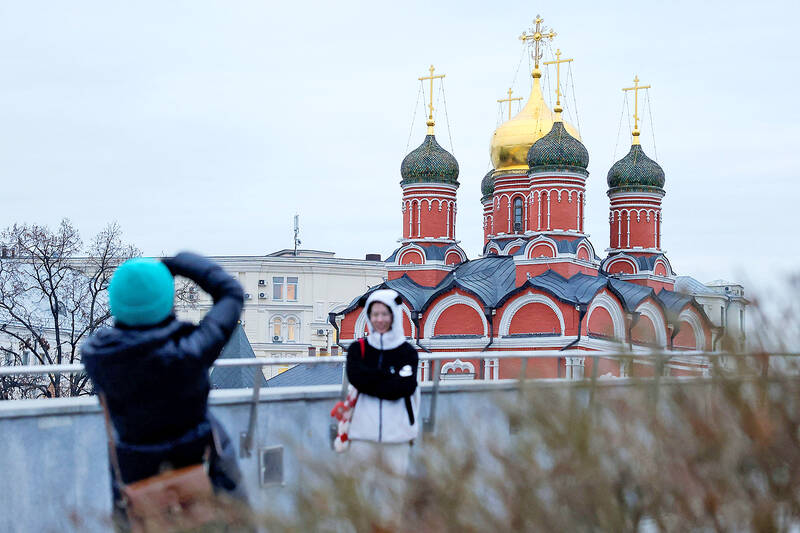Russia could face a wave of corporate bankruptcies this year as the share of enterprises with risky levels of debt in total corporate revenue doubled last year, a leading think tank advising the government said in a research note.
The warning emphasizes the scale of high inflation and slowing growth, which could have made Russian President Vladimir Putin concerned about distortions in the nation’s wartime economy.
“The Russian economy is facing the threat of a large-scale surge in corporate bankruptcies,” TsMAKP researchers wrote.

Photo: Reuters
They said that by the end of last year, the share of companies represented in total corporate revenue that had interest payments at a risky level of two-thirds of adjusted earnings, was likely at 20 percent.
The Russian central bank hiked its benchmark interest rate to 21 percent last year, the highest since the early 2000s, to fight inflation which hit 9.5 percent in the year, exceeding the government’s and the central bank’s forecasts.
Many companies have complained about high interest rates, which raise their borrowing costs. Russia’s largest mobile operator, MTS, in November last year blamed an 88.8 percent drop in third-quarter net profit on increased interest expenses.
The state-owned monopoly Russian Railways is facing a US$4 billion rise in interest payment costs this year.
TsMAKP researchers also pointed to a surge in the share of firms experiencing non-payments from their counterparties for supplied goods and services, which rose to 37 percent of total revenue in the third quarter of last year from about 20 percent in 2021 to 2023.
They said many firms preferred to deposit cash at banks amid high interest rates or buy risk-free bonds, which also offer attractive interest, while withholding payment to suppliers.
The research indicated that in the current high interest rate environment, the share of companies with working capital profitability that was lower than the risk-free interest rate also doubled to 66 percent of total corporate revenues.
This was stifling investment, the researchers said.
“A slowdown in the dynamics of investments in production facilities and a reduction in the potential for economic growth are already being factored in,” researchers said, projecting a fall in investments to 1.7 to 2.0 percent this year from 7 percent last year.

Jensen Huang (黃仁勳), founder and CEO of US-based artificial intelligence chip designer Nvidia Corp and Taiwan Semiconductor Manufacturing Co (TSMC, 台積電) on Friday celebrated the first Nvidia Blackwell wafer produced on US soil. Huang visited TSMC’s advanced wafer fab in the US state of Arizona and joined the Taiwanese chipmaker’s executives to witness the efforts to “build the infrastructure that powers the world’s AI factories, right here in America,” Nvidia said in a statement. At the event, Huang joined Y.L. Wang (王英郎), vice president of operations at TSMC, in signing their names on the Blackwell wafer to

AI BOOST: Although Taiwan’s reliance on Chinese rare earth elements is limited, it could face indirect impacts from supply issues and price volatility, an economist said DBS Bank Ltd (星展銀行) has sharply raised its forecast for Taiwan’s economic growth this year to 5.6 percent, citing stronger-than-expected exports and investment linked to artificial intelligence (AI), as it said that the current momentum could peak soon. The acceleration of the global AI race has fueled a surge in Taiwan’s AI-related capital spending and exports of information and communications technology (ICT) products, which have been key drivers of growth this year. “We have revised our GDP forecast for Taiwan upward to 5.6 percent from 4 percent, an upgrade that mainly reflects stronger-than-expected AI-related exports and investment in the third

RARE EARTHS: The call between the US Treasury Secretary and his Chinese counterpart came as Washington sought to rally G7 partners in response to China’s export controls China and the US on Saturday agreed to conduct another round of trade negotiations in the coming week, as the world’s two biggest economies seek to avoid another damaging tit-for-tat tariff battle. Beijing last week announced sweeping controls on the critical rare earths industry, prompting US President Donald Trump to threaten 100 percent tariffs on imports from China in retaliation. Trump had also threatened to cancel his expected meeting with Chinese President Xi Jinping (習近平) in South Korea later this month on the sidelines of the APEC summit. In the latest indication of efforts to resolve their dispute, Chinese state media reported that

CHINESE EXPORT CURBS: A dispute between China and the Netherlands could halt chip supply, affecting vehicle production, US and European auto associations said Groups representing major automakers late on Thursday warned that a chip disruption stemming from a dispute between China and the Dutch government could quickly affect US auto production. Automakers and their suppliers received notice from chipmaker Nexperia (安世半導體) last week that it could no longer guarantee delivery of its chips, the European Automobile Manufacturers Association said, adding that manufacturing could be significantly disrupted. In the US, the Alliance for Automotive Innovation, which represents General Motors, Toyota, Ford, Volkswagen, Hyundai and nearly all other major automakers, urged a quick resolution. “If the shipment of automotive chips doesn’t resume — quickly — it’s going to